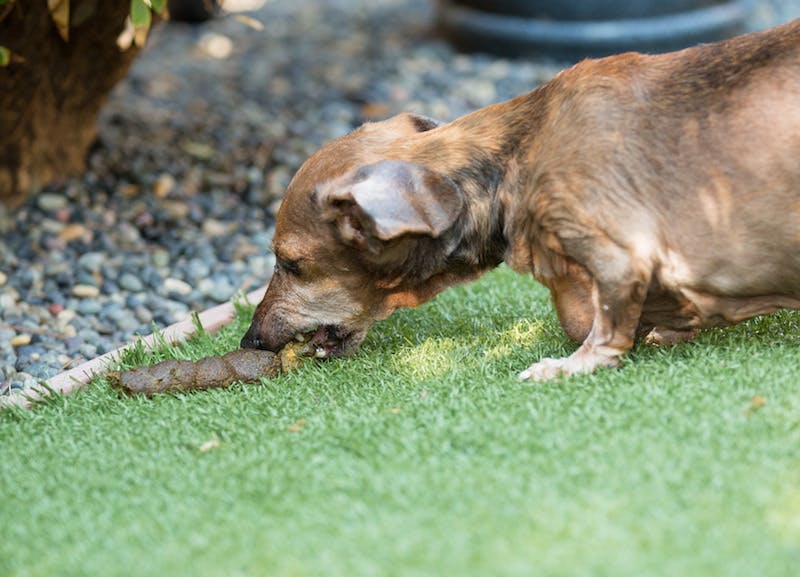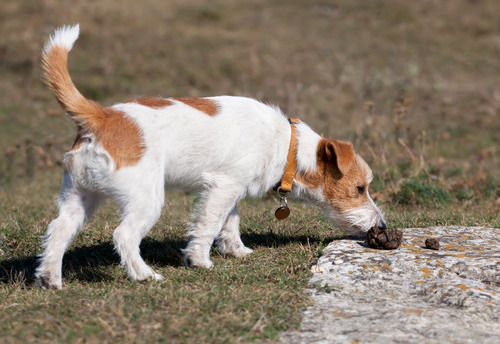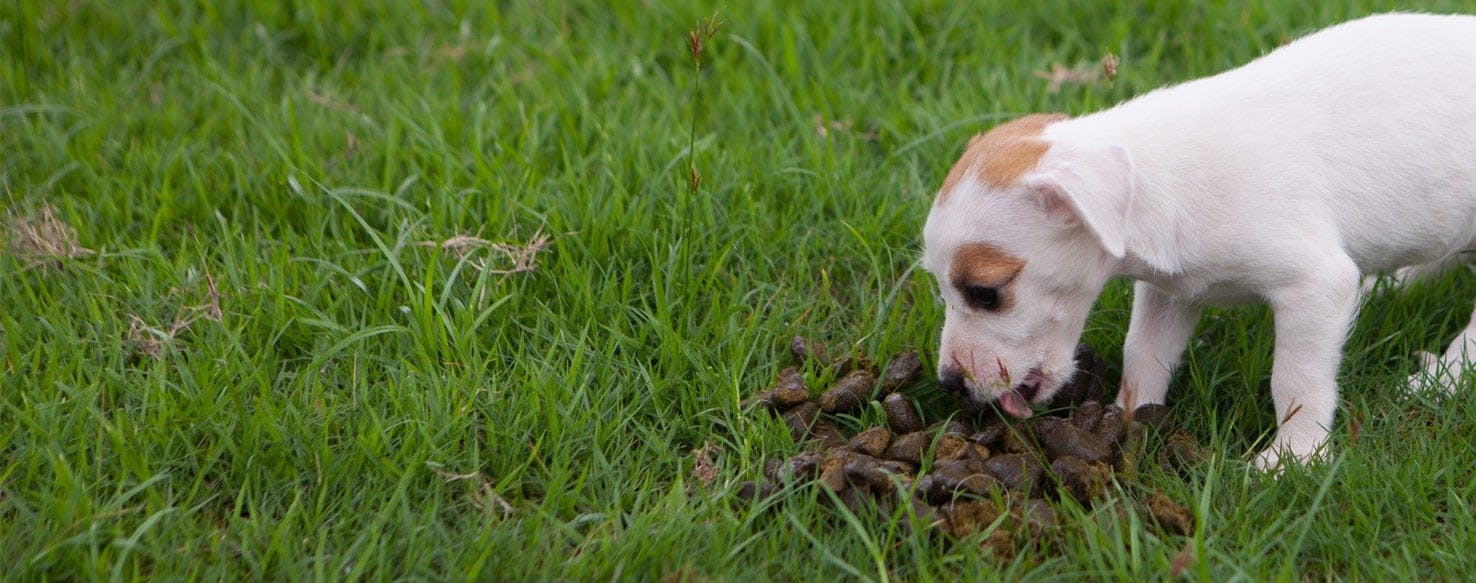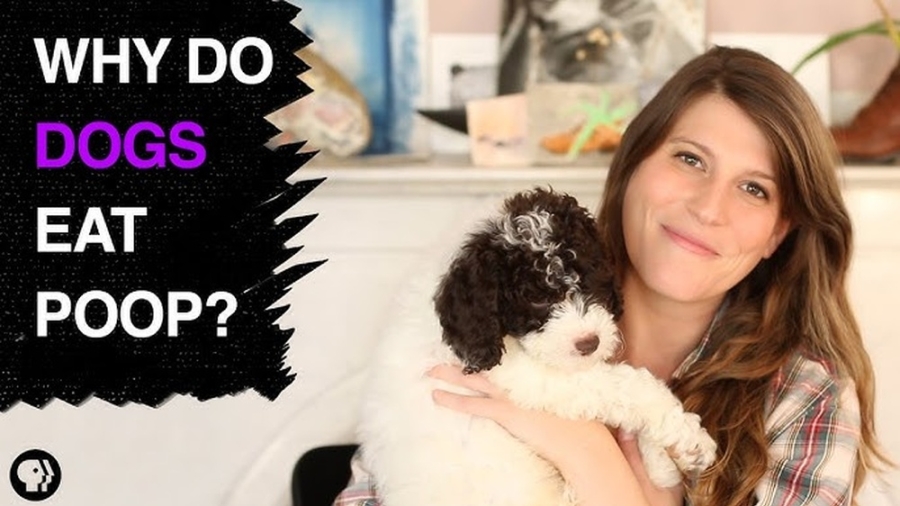Have you ever caught your poodle munching on something you definitely didn’t expect—like poop? It’s a behavior that can leave you puzzled and even a bit grossed out.
You might be wondering, “Do poodles really eat poop? And if so, why? ” Understanding why your furry friend does this is key to keeping them healthy and happy. You’ll discover the surprising reasons behind this habit, the risks it poses, and what you can do to stop it.
Keep reading to learn how to protect your poodle and enjoy a cleaner, safer companionship.

Poodle Poop Eating Habits
Poodles sometimes show a habit called coprophagia, which means eating poop. This behavior can surprise many dog owners. Understanding why poodles do this helps owners manage the habit better.
Not all poodles eat poop, but some do it occasionally. Their reasons vary from curiosity to health issues or stress. Knowing these causes can guide owners to stop the behavior safely.
Why Do Poodles Eat Poop?
Poodles may eat poop because of boredom or stress. Sometimes, they try to clean their space. Other times, they lack some nutrients in their diet. Puppies might copy older dogs or explore with their mouths.
Eating poop can expose poodles to bacteria and parasites. These cause infections and illnesses. Poop from other animals is especially risky. It can lead to stomach upset, diarrhea, or worse health problems.
How To Prevent Poop Eating In Poodles
Keep your poodle’s area clean and remove poop quickly. Provide enough toys and exercise to reduce boredom. Feeding a balanced diet helps meet nutritional needs. Training and commands can stop the behavior too.

Why Dogs Eat Poop
Dogs sometimes eat poop, a behavior called coprophagia. This habit puzzles many pet owners. Understanding why dogs do this helps manage it better. Various reasons drive this strange habit. Some come from natural instincts. Others relate to health or environment. Knowing these causes aids in keeping dogs safe and healthy.
Instinct And Survival
In the wild, dogs eat poop to hide their scent. This keeps predators away and protects their pack. Mother dogs also eat their puppies’ feces. This cleans the den and prevents enemies from finding the young. Instinct may cause some dogs to eat poop even at home.
Health And Nutritional Deficiencies
Dogs lacking certain nutrients might eat poop to replace them. Poor diet or digestive issues can lead to this behavior. Some dogs eat feces from other animals to gain extra nutrients. If a dog often eats poop, a vet check is wise. This rules out health problems and nutrient gaps.
Boredom And Stress
Dogs under stress or boredom may eat poop. It can be a way to get attention or relieve anxiety. Dogs left alone too long sometimes develop this habit. Providing toys and exercise reduces stress and boredom. This lowers the chance of poop eating.
Environmental Factors
Dogs in dirty spaces may eat poop more. They might clean their area by eating feces. Puppies learn this behavior from their mother or siblings. Training and keeping the area clean helps stop it. Quick waste removal is key to prevent this habit.
Common Breeds Prone To Coprophagia
Some dog breeds show a higher tendency toward coprophagia, the habit of eating poop. This behavior puzzles many pet owners. Understanding which breeds are more prone helps in managing and preventing the habit effectively.
These breeds often have strong appetites or specific behavioral traits that contribute to this habit. Knowing the common offenders guides owners to watch for early signs and take action.
Labrador Retriever
Labradors are known for their large appetites and curiosity. They may eat poop due to boredom or to explore their environment. This breed requires plenty of exercise and mental stimulation to reduce such behaviors.
Beagle
Beagles have a strong sense of smell and love to sniff around. Their hunting instincts can lead them to eat feces. Keeping a Beagle busy and supervised helps prevent coprophagia.
German Shepherd
German Shepherds are intelligent and energetic dogs. Stress or anxiety can trigger them to eat poop. Consistent training and attention reduce the chances of this unwanted habit.
Golden Retriever
Golden Retrievers are friendly and food-driven. They might eat poop due to nutritional deficiencies or curiosity. A balanced diet and regular vet check-ups can help.
Basset Hound
Basset Hounds have a strong nose and love to explore. Their tendency to scavenge can lead to eating feces. Owners should monitor their environment closely.
Boxer
Boxers are playful and sometimes anxious dogs. Stress or boredom can cause them to eat poop. Providing toys and exercise can reduce this behavior.
Shih Tzu
Shih Tzus are small dogs that may eat poop out of stress or habit. Gentle training and positive reinforcement can help correct this behavior.
Dachshund
Dachshunds are curious and stubborn. They might eat poop to seek attention or due to boredom. Engaging them regularly helps prevent this habit.
Health Risks Of Eating Poop
Eating poop can cause serious health problems for poodles. Poop carries germs that may harm your dog’s body. Knowing these risks helps you protect your pet from illness and discomfort.
Parasites, Bacteria, And Viruses
Poop often contains parasites and harmful bacteria. These germs can infect your poodle’s intestines. Dogs may get sick with diarrhea, vomiting, or worse. Bacteria like E. coli and salmonella are common threats. Viruses can also spread through feces. These infections require veterinary care and can be costly.
Zoonotic Diseases
Some germs in dog poop can infect humans too. This risk is called zoonotic disease transmission. Children and elderly people are most vulnerable. Washing hands after touching your dog or cleaning poop is crucial. Keeping your poodle from eating poop lowers the risk for your family.
Gastrointestinal Upset
Eating poop sometimes causes stomach problems. Your poodle may feel nauseous or vomit. Diarrhea and lack of energy can follow. These symptoms often need medical attention. Preventing poop eating helps avoid these painful episodes.
Nutritional Issues
Poodles might eat poop due to missing nutrients. This behavior can signal a diet problem. Poor nutrient absorption or deficiencies may be the cause. A vet can check your dog’s health and suggest diet changes. Proper nutrition reduces the urge to eat poop.
Gastrointestinal Impaction
Ingesting large amounts of feces or foreign material can block the intestines. Cat litter or undigested objects in poop raise this risk. Impaction causes severe pain and needs urgent care. Watch your poodle closely and stop this habit early to avoid such dangers.
Parasites And Diseases Concern
Eating poop can expose poodles to harmful parasites and diseases. These health risks affect both the dog and humans nearby. Understanding these dangers helps protect your poodle’s health.
Parasites In Feces
Feces often contain parasites like roundworms and hookworms. These parasites can infect your poodle and cause serious health problems. Some parasites live in the intestines and damage the digestive system.
Parasites may lead to weight loss, vomiting, and diarrhea. Regular vet check-ups and parasite prevention are essential for your dog’s safety.
Bacterial And Viral Infections
Dog poop can carry harmful bacteria such as E. coli and Salmonella. These bacteria cause infections that may result in fever, stomach upset, and dehydration.
Viruses may also be present in feces and spread illness. These infections can weaken your poodle’s immune system and require veterinary care.
Risk Of Zoonotic Diseases
Some parasites and bacteria in poop can infect humans. Children and older adults face higher risks from these diseases.
Always wash your hands after handling your dog or cleaning up waste. This practice reduces the chance of spreading infections to your family.
Gastrointestinal Upset
Eating poop can upset your poodle’s stomach. Symptoms include nausea, vomiting, diarrhea, and lack of energy.
This distress can make your dog uncomfortable and may need treatment. Avoid letting your poodle eat feces to prevent these issues.
Possible Nutritional Deficiencies
Sometimes, poop eating signals a lack of nutrients in your dog’s diet. Your poodle might try to get missing vitamins or minerals.
Consult your vet to check your dog’s diet and health. Proper nutrition reduces the urge to eat feces.
Gastrointestinal Blockages
Eating large amounts of feces or foreign materials like cat litter can cause blockages. These blockages may need emergency medical help.
Prevent access to harmful items and monitor your poodle’s behavior closely. Quick action can save your dog’s life.
Behavioral Causes In Poodles
Poodles sometimes eat poop due to their behavior. This habit is called coprophagia. It can stem from several behavioral reasons.
Understanding these causes helps in managing and correcting the behavior. Poodles may eat poop out of boredom or stress. Some feel anxious when left alone for long periods. Eating poop might be a way to relieve that anxiety.
Boredom And Lack Of Stimulation
Poodles are smart dogs that need mental and physical activity. Without enough play or exercise, they get bored. Boredom can lead to unusual habits like eating poop. Providing toys and daily walks can help reduce this behavior.
Stress And Anxiety
Stress can trigger many unwanted behaviors in dogs. Poodles may eat poop when they feel nervous or scared. Changes in their environment or routine can cause stress. Comfort and calm surroundings are important for them.
Instinct To Clean
Poodles sometimes eat poop to keep their living area clean. This instinct comes from their wild ancestors. Mother dogs clean their puppies by eating their waste. Poodles may copy this behavior to keep their space tidy.
Attention-seeking Behavior
Some poodles eat poop to get attention from their owners. Negative or positive attention can encourage this habit. Ignoring the behavior and rewarding good habits helps change this pattern.
Nutritional And Medical Factors
Poodles eating poop can sometimes relate to nutritional and medical reasons. Understanding these factors helps address this behavior effectively. Some dogs eat feces due to missing nutrients in their diet. Others may have medical issues causing this habit.
Identifying the root cause improves your dog’s health and well-being. Medical and nutritional checks are important to stop poop eating in poodles.
Medical Conditions Affecting Poodles
Certain illnesses can make poodles eat poop. Problems like diabetes or parasites affect digestion. These conditions may cause hunger or poor nutrient absorption. Dogs try to get missing nutrients by eating feces. Regular vet visits can detect these issues early. Treating medical problems often stops this behavior.
Nutritional Deficiencies And Diet
Poodles need balanced meals with all essential nutrients. A poor diet can cause them to seek nutrients elsewhere. Lack of vitamins or minerals may trigger poop eating. Feeding high-quality dog food supports their health. Sometimes, supplements help if the diet lacks key nutrients. Proper feeding reduces the chance of this behavior.
Digestive Problems And Enzyme Deficiency
Digestive troubles can lead to eating feces. Some poodles cannot digest food properly due to enzyme shortages. This causes them to try to re-eat feces for nutrients. Symptoms include gas, diarrhea, and weight loss. Your vet may suggest enzyme supplements. Fixing digestion often stops the habit.
Preventing Poop Eating
Preventing poop eating in poodles requires patience and consistent effort. This behavior, known as coprophagia, can be unpleasant and unhealthy. Stopping it helps keep your poodle safe and your home clean. Using simple strategies can reduce or eliminate this habit.
Keep The Environment Clean
Remove feces from your yard or living area quickly. Regularly clean up after your dog during walks. This limits the chance for your poodle to access poop. A clean space discourages the behavior.
Provide A Balanced Diet
Feed your poodle a high-quality, nutritious diet. Nutritional gaps can cause poop eating. Consult your vet to ensure the diet meets all needs. Proper nutrition reduces the urge to eat feces.
Use Deterrent Products
Special additives in food can make poop taste unpleasant. These deterrents help stop your dog from eating feces. Speak with your vet before using any product. Consistent use can train your poodle to avoid poop.
Increase Exercise And Playtime
Boredom and stress often trigger poop eating. Engage your poodle in regular exercise and play. Mental stimulation keeps your dog busy and reduces unwanted habits. Tired dogs are less likely to eat poop.
Train With Commands
Teach your poodle commands like “leave it” or “no.” Use positive reinforcement when they obey. Training helps control the behavior during walks or outdoor time. Clear commands prevent accidental poop eating.
Consult A Veterinarian
Rule out medical problems that may cause coprophagia. Conditions like nutrient absorption issues or parasites need treatment. A vet can recommend tests and proper care. Addressing health issues stops the behavior at its root.
Training Tips To Stop Coprophagia
Training a poodle to stop eating poop requires patience and consistency. This behavior, known as coprophagia, can be unsettling for owners. Yet, with the right approach, you can reduce or eliminate it. Focus on positive reinforcement and clear communication. Your poodle needs to understand what is acceptable and what is not.
Start training early and be consistent. Use simple commands and reward good behavior. Avoid punishment as it may increase stress and worsen the behavior. Instead, redirect your dog’s attention to more appropriate activities. These training tips can help you manage coprophagia effectively.
Teach The “leave It” Command
Start by teaching your poodle the “leave it” command. This command helps your dog ignore unwanted items, including poop. Hold a treat in your hand and say “leave it.” When your dog looks away, give the treat. Practice often in different places. Gradually use the command near poop. Praise your dog when it listens.
Keep The Yard Clean
Remove feces from your yard immediately. A clean environment reduces temptation. Check your yard several times daily. Use gloves or a pooper scooper for hygiene. A tidy yard helps your poodle avoid the habit. This simple step supports training efforts.
Increase Exercise And Mental Stimulation
Boredom can cause coprophagia. Increase your poodle’s exercise with walks and playtime. Provide toys that challenge your dog’s mind. Puzzle feeders and chew toys work well. A tired and engaged dog is less likely to eat poop. Regular activity improves overall behavior.
Use Taste Deterrents
Some products make poop taste unpleasant to dogs. Apply these deterrents to your dog’s feces. Follow product instructions carefully. Taste deterrents can discourage your poodle from eating poop. Combine this with training for better results.

Frequently Asked Questions
What Dog Breeds Are Prone To Eating Poop?
Breeds prone to eating poop include Labrador Retrievers, Beagles, Basset Hounds, German Shepherds, Boxers, Shih Tzus, Golden Retrievers, and Dachshunds. These dogs often exhibit this behavior due to instincts, boredom, or nutritional needs.
Is It Unhealthy For My Dog To Eat His Poop?
Eating poop can expose dogs to parasites, bacteria, and viruses, risking illness. It may indicate nutritional or health issues. Prevent access to feces and consult a vet to address this behavior and ensure your dog’s health.
What Do I Do If My Dog Ate My Poop?
Monitor your dog closely and prevent access to feces. Consult a vet to check for parasites or health issues. Clean up waste promptly to reduce temptation. Use training to discourage the behavior and ensure a balanced diet to address possible nutritional needs.
Is Eating Poop A Behavioral Issue In Dogs?
Eating poop in dogs often stems from behavioral issues like boredom, stress, or instinct. It can also signal nutritional or medical problems. Addressing the cause with a vet and managing the environment helps reduce this behavior effectively.
Conclusion
Poodles may eat poop for several reasons like boredom or diet gaps. This habit can expose them to harmful germs and cause sickness. Always watch your dog and keep their area clean to reduce this behavior. Consult a vet if the problem continues or worsens.
Understanding why your poodle does this helps protect their health and your home. Small changes can stop this habit and keep your dog happy.

